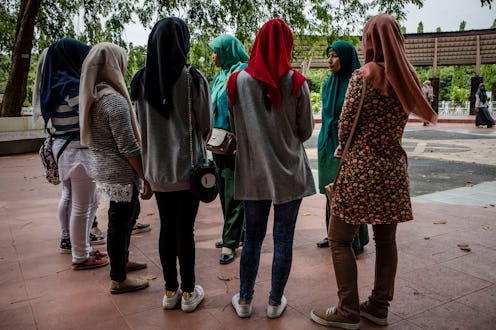
On Sunday evening, one person was killed and ten were left injured when a van drove into a group of worshippers outside of a London mosque. Police noted Monday that they are classifying the incident as "clearly" a terrorist attack targeting Muslims. In light of this act, you might be wondering how you can help fight Islamophobia after the Finsbury Park mosque attack.
Just after midnight on Sunday, a white van plowed into worshippers as they were exiting the Finsbury Park mosque in North London following evening prayers. After the attack, the driver of the van was detained by people on the scene and subsequently taken into police custody. All of the individuals harmed in the attack were Muslim.
Metropolitan Police Deputy Assistant Commissioner Neil Basu said that the incident at the Finsbury Park mosque is "being treated as a terrorist attack." British Prime Minister Theresa May also added in a recent statement that the incident was "an attack on Muslims near their place of worship ... And like all acts of terrorism, it seeks to drive us apart."
According to The Telegraph, the Muslim Council of Britain has characterized the Finsbury Park attack as the "most violent manifestation of Islamophobia" and, sadly, indicated that many Muslims are now afraid for their own safety and well-being. Indeed, this attack has once again drawn attention to the notion that it is exceedingly necessary to combat Islamophobia, something which you can do regardless of whether you are in the U.K. or elsewhere.
First and foremost, if you see anyone exhibiting Islamophobia (i.e. by decrying or harassing Muslims or discriminating against them), it is critical that you speak up and indicate that you are not willing to tolerate any form of Islamophobia.
Indeed, earlier this year, a young illustrator and author named Maeril created this guide for what to do if you are witnessing Islamophobic harassment. The guide's tips are exceedingly helpful and are something which everyone should have in their arsenal to help guide them in taking a stand against Islamophobia, should the need arise.
Moreover, it is also important to keep in mind that, in addition to taking a stand against Islamophobic harassment in-person, it is also equally important to do so in online conversations by calling out others' Islamophobic words and comments.
You can also combat Islamophobia by learning and listening. The Center for Religious and Spiritual Life and the Office of Inclusion, Diversity, and Equity at Smith College recommend taking some time to learn about the Muslim faith and the tenets of Islam — and then using what you have learned to share insights with others who may have erroneous notions about of what the Muslim faith consists. Ideally, allow Muslims to guide your learning about their faith, through taking Muslim-led classes, reading Muslim-authored literature, or through talking with Muslim friends (but do not assume that the onus is them to teach you about their faith).
Finally, you can also combat Islamophobia by directly expressing support for Muslims in your community. Tariq Yusuf of The Seattle Globalist suggests considering attending Muslim-led community events and/or sending notes or postcards to your local mosque expressing solidarity and kinship. Furthermore, consider using your in-person and online networks to promote Muslim-led activities and fundraisers, especially those that arise in times of tragedy.
Overall, it is imperative to combat Islamophobia, especially following such a tragic incident that reportedly directly targeted Muslim lives. These are just some of the many ways in which you can help take a stand Islamophobia, in your community and beyond. In addition to these suggestions, make sure to keep an eye out for other ways in which you can help, particularly by looking out for direct requests for various types of assistance from the Muslim community.